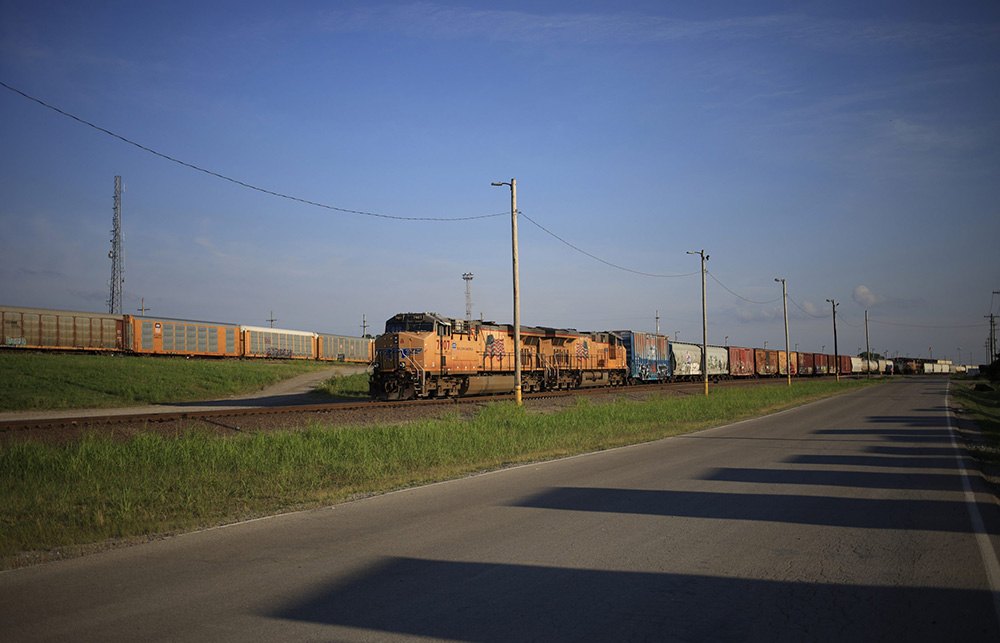
本月早些时候,艾克•布兰农和迈克尔•戈尔曼在《财富》杂志洋洋洒洒地发表了一篇评论文章,试图驳斥我对铁路货运精确调度系统(PSR)的担忧。请允许我把话说清楚。
我在美国众议院交通和基础设施委员会工作了34年,历经7届不同的联邦政府(包括民主党和共和党政府)。作为一位公共政策制定者,我深知货物运输对美国经济的极端重要性。高效、可靠和安全的货运能力使我们在全球经济中更具竞争力。
运输业的许多利益相关者都认为,铁路货运对减少美国的碳排放至关重要。运输业目前是美国温室气体排放最高的行业,将更多的货运从卡车转向铁路可以显著减少这些排放。据铁路货运行业估计,如果将至少行驶750英里的卡车运输中的25%改为铁路运输,每年的温室气体排放量将减少约1310万吨。
但PSR系统并不是一种花里胡哨,旨在增加货运量、改善运营和减少排放的优化策略。相反,这是华尔街为提高短期利润而推行的一种商业策略。华尔街的投资者已经证明,他们并不关心他们想从中获取财富的行业的长期健康状况。同样,他们也不关心是否有一个高效、可靠和安全的货运服务来推动美国经济。
而且他们对此并不隐瞒。投资者电话会议表明,目光短浅的华尔街投资者只关注短期利润,竭力要求铁路公司通过削减成本和增加收入来提高季度利润。这样做所牺牲的,是卓越的铁路货运服务和行业的长期健康。
在我供职的委员会和地面运输委员会(STB)召开的公开聆讯会上,在一些公开信中,许多托运人详细阐述了PSR系统对货运的影响。这些影响包括对运营计划和服务时间表的破坏性改变;服务质量退化,比如由于机车动力不足和缺乏工作人员而造成的延误;以及不合理的收费,比如随意增加滞期费和附加费。一些托运人甚至因此而被迫使用更多的卡车运输。
PSR系统的诸多影响之一是列车长度的无节制增长。美国政府问责署(GAO)的一项研究发现,2008年至2017年,两家Ⅰ级铁路公司(这个级别包括美国7家最大的铁路公司)的列车长度增加了25%。每家Ⅰ级铁路公司的官员都表示,他们运营的列车越来越长,其中一些延伸数英里。在投资者电话会议上,铁路货运公司不停地吹嘘其列车长度每年都在增长。
联邦铁路管理局(FRA)仍在研究这些长列车的安全影响。在投资者获得利益的同时,普通民众却在经历种种弊端。全美城市联盟(National League of Cities),以及州和地方官员纷纷向美国政府问责署抱怨,过去只是几分钟的烦恼,现在却会导致整个社区的交通堵塞和紧急服务延误。
而且情况越来越糟。根据我在多场听证会上听到的证词,这些更长的列车更加频繁地堵塞道口,堵塞的时间也更长。华尔街可能不在乎,但普通民众很在意。
最后要说的是,没有一支强大的劳动力队伍,铁路货运就无法运转。我们不要忘记,在新冠肺炎疫情袭来之前,从2015年到2019年,铁路货运行业将其劳动力平均削减了17%以上。难怪地面运输委员会主席马丁·奥伯曼一直在搜寻信息,试图搞清楚托运人近期的抱怨是否跟如此大规模的裁员有关。与华尔街的百万富翁和亿万富翁相比,我更关心中产阶级工人的福祉和安全。这或许是我的不对。但只有背负这种负担,我才会睡得更安稳。
我的目标一直是,现在仍然是培育一个健康的铁路货运市场,以推动整体经济并减少碳排放。华尔街的目标是变得更富有——不管我们的经济、环境、运输系统或广大劳动者由此遭受什么影响。(财富中文网)
译者:任文科
本月早些时候,艾克•布兰农和迈克尔•戈尔曼在《财富》杂志洋洋洒洒地发表了一篇评论文章,试图驳斥我对铁路货运精确调度系统(PSR)的担忧。请允许我把话说清楚。
我在美国众议院交通和基础设施委员会工作了34年,历经7届不同的联邦政府(包括民主党和共和党政府)。作为一位公共政策制定者,我深知货物运输对美国经济的极端重要性。高效、可靠和安全的货运能力使我们在全球经济中更具竞争力。
运输业的许多利益相关者都认为,铁路货运对减少美国的碳排放至关重要。运输业目前是美国温室气体排放最高的行业,将更多的货运从卡车转向铁路可以显著减少这些排放。据铁路货运行业估计,如果将至少行驶750英里的卡车运输中的25%改为铁路运输,每年的温室气体排放量将减少约1310万吨。
但PSR系统并不是一种花里胡哨,旨在增加货运量、改善运营和减少排放的优化策略。相反,这是华尔街为提高短期利润而推行的一种商业策略。华尔街的投资者已经证明,他们并不关心他们想从中获取财富的行业的长期健康状况。同样,他们也不关心是否有一个高效、可靠和安全的货运服务来推动美国经济。
而且他们对此并不隐瞒。投资者电话会议表明,目光短浅的华尔街投资者只关注短期利润,竭力要求铁路公司通过削减成本和增加收入来提高季度利润。这样做所牺牲的,是卓越的铁路货运服务和行业的长期健康。
在我供职的委员会和地面运输委员会(STB)召开的公开聆讯会上,在一些公开信中,许多托运人详细阐述了PSR系统对货运的影响。这些影响包括对运营计划和服务时间表的破坏性改变;服务质量退化,比如由于机车动力不足和缺乏工作人员而造成的延误;以及不合理的收费,比如随意增加滞期费和附加费。一些托运人甚至因此而被迫使用更多的卡车运输。
PSR系统的诸多影响之一是列车长度的无节制增长。美国政府问责署(GAO)的一项研究发现,2008年至2017年,两家Ⅰ级铁路公司(这个级别包括美国7家最大的铁路公司)的列车长度增加了25%。每家Ⅰ级铁路公司的官员都表示,他们运营的列车越来越长,其中一些延伸数英里。在投资者电话会议上,铁路货运公司不停地吹嘘其列车长度每年都在增长。
联邦铁路管理局(FRA)仍在研究这些长列车的安全影响。在投资者获得利益的同时,普通民众却在经历种种弊端。全美城市联盟(National League of Cities),以及州和地方官员纷纷向美国政府问责署抱怨,过去只是几分钟的烦恼,现在却会导致整个社区的交通堵塞和紧急服务延误。
而且情况越来越糟。根据我在多场听证会上听到的证词,这些更长的列车更加频繁地堵塞道口,堵塞的时间也更长。华尔街可能不在乎,但普通民众很在意。
最后要说的是,没有一支强大的劳动力队伍,铁路货运就无法运转。我们不要忘记,在新冠肺炎疫情袭来之前,从2015年到2019年,铁路货运行业将其劳动力平均削减了17%以上。难怪地面运输委员会主席马丁·奥伯曼一直在搜寻信息,试图搞清楚托运人近期的抱怨是否跟如此大规模的裁员有关。与华尔街的百万富翁和亿万富翁相比,我更关心中产阶级工人的福祉和安全。这或许是我的不对。但只有背负这种负担,我才会睡得更安稳。
我的目标一直是,现在仍然是培育一个健康的铁路货运市场,以推动整体经济并减少碳排放。华尔街的目标是变得更富有——不管我们的经济、环境、运输系统或广大劳动者由此遭受什么影响。(财富中文网)
译者:任文科
In a commentary published in Fortune earlier this month, Ike Brannon and Michael F. Gorman took great liberties in trying to debunk my concerns with precision scheduled railroading (PSR). Please allow me to set the record straight.
I have served on the U.S. House Committee on Transportation and Infrastructure for 34 years, crafting public policy through seven different presidential administrations, both Democratic and Republican. Freight transportation is critical to our economy. The ability to efficiently, reliably, and safely deliver freight makes us more competitive in the global economy.
And many transportation stakeholders agree that freight rail is critical to reducing our nation’s carbon emissions. The transportation sector is now the highest emitter of greenhouse gases in the country and shifting more freight from trucks to rail could significantly reduce these emissions. Freight railroads estimate that if 25% of the truck traffic moving at least 750 miles went by rail instead, annual greenhouse gas emissions would fall by approximately 13.1 million tons.
But PSR is not some fancy optimization strategy to increase freight volume or improve operations and reduce emissions; rather, it is a business strategy promoted by Wall Street to boost short-term profits. Wall Street investors have proven they don’t care about the long-term health of the industries from which they seek to extract wealth. Similarly, they don’t care about ensuring an efficient, reliable, and safe freight service that drives the U.S. economy.
And they’re not hiding it. Investor calls demonstrate that Wall Street investors’ myopic focus on short-term profits demands that railroads boost quarterly profits by cutting costs and increasing revenues. In doing so, great freight rail service and the long-term health of the industry is sacrificed.
At public proceedings before my committee and the Surface Transportation Board (STB), and in public letters, an array of shippers have detailed the effects PSR has had on freight movement. These include disruptive changes to operating plans and service schedules; degradation of service, such as delays due to insufficient locomotive power and lack of crews; and unreasonable charges, such as increases in demurrage and accessorial fees. Some shippers have even been forced to use more trucking as a result.
One of the many impacts of PSR is the uncontrolled growth in train lengths. A U.S. Government Accountability Office (GAO) study found that between 2008 and 2017, train length grew by 25% for two Class I railroads (which comprise the seven largest railroads in the U.S.), and officials from each Class I stated they operate longer trains, including some that extend for several miles. Freight railroad investor calls continue to boast annual train length increases every year.
The Federal Railroad Administration (FRA) is still studying the safety impacts of these long trains. While investors reap the benefits, the general public experiences the drawbacks. What was once a few-minute annoyance now can cause community-wide traffic jams and emergency services delays—concerns expressed to the GAO by the National League of Cities and state and local officials.
And it’s getting worse. In multiple committee hearings, I have heard testimony that these longer trains are more frequently blocking crossings for longer amounts of time. Wall Street may not care, but Main Street does.
And finally, freight rail does not function without a strong workforce. Let’s not forget that prior to COVID-19, from 2015 to 2019, the freight railroad industry slashed the average size of its workforce by over 17%. It’s little wonder that STB Chairman Martin Oberman has sought information about how such a reduction may be related to or contributed to recent shipper complaints. I may be guilty of caring about middle-class workers and their safety more than Wall Street millionaires and billionaires, but I sleep just fine bearing that burden.
My goal has been and remains to foster a healthy freight rail market that boosts the overall economy and reduces carbon emissions. Wall Street’s goal is to get wealthier—no matter the impact on our economy, environment, transportation system, or workforce.






